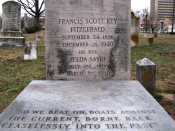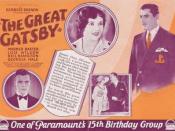Heat in The Great Gatsby represents the fiery emotions of the characters, which build up and cause intense conflict both within themselves and among those of different social classes. The warm weather at the onset of the novel leaves the reader with the impression that Nick's visit to the Buchanans will be uplifting, reflecting the weather. However, Tom is depicted as an irrational bigot, especially when he advocates Nordic domination. A negative tone is set for wealthy people in general; Nick is judging this haughtiness, but he does not want to be critical. This causes conflict between the two opposites within himself. The novel opens with divisions between class and an introduction to conflict within self, where heat is yet to cause deep conflict.
Later on, the varying emotional reactions the people on the train have to the heat foreshadow the events, particularly those relating to Daisy, yet to occur in the hotel room.
One passenger seems especially stunned and helpless, depicting how Daisy will feel later. (115) The conflict between Tom and Gatsby, two men from opposing social classes vying for one girl's love, occurred on the hottest day of the year in a hotel room. Daisy constantly complains about the heat and is the only character to truly do so. This shows that the heat directly adversely affects her. She has always felt a certain heat, passion, for Gatsby and has a sharp conflict within herself, as she is confused by her feelings; she is a married woman and has to choose between Gatsby and Tom. On the other hand, Tom is conflicted due to a more selfish cause.
Tom scorns Gatsby about his love for Daisy; Tom has seen his wife display her love for Gatsby, making him feel that his life is spinning out of control. Furthermore, the term oppressive, as Nick narrates, "â¦We shot off into the oppressive heat..." (129) has a dual meaning. The term not only describes the intense heat, but the fact that Tom feels pain due to his subordination to Gatsby. He has lost his authority and control, the center of his haughtiness. The feelings that Tom has relied on are slowly slipping away, causing intense conflict within himself, due to the clashing of classes between him and the newly rich Gatsby.
Bibliography:The Great Gatsby by F. Scott Fitzgerald





